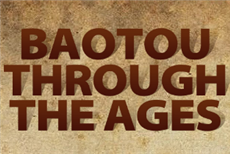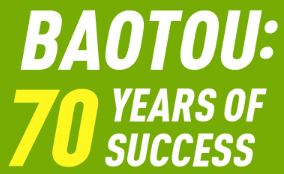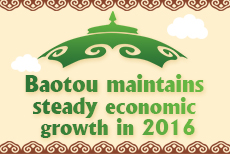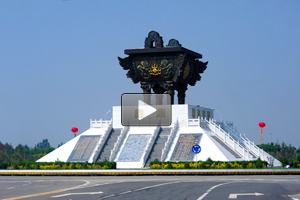Marriage customs in Baotou
Marriage customs in Baotou combine ethnic culture, unique folk customs and melodious singing and dancing with hilarious activities. It embodies the diligence, courage and intelligence of Inner Mongolians.
The common marriage customs are usually divided into three parts - the engagement, the wedding ceremony and the “Huimen,” (the bride returning to her mother's home after wedding ceremony).
On the wedding day, the bridegroom wears a red robe and a pair of tall boots, with a golden belt wrapped around his waist. Then he gathers with a guider and a toast master to the “Manihong Qigan” a in front of every Mongolian yurt that symbolizes the braveness of Inner Mongolians - to sing a song for the bride.
After the song, the escorting procession heads for the bride’s home in the evening on horseback.
According to the traditional custom, the escorting procession must circle the city of the bride before disembarking the horse in front of the bride’s Mongolian yurt. The bride’s family members, relatives and friends will welcome the escorting procession, but prevent them from entering the yurt with a colorful silk ribbon, as if they are refusing the bridegroom to marry the bride.
The toast master of the escorting procession will sing a song asking for entry, after which the bridesmaids will reply with songs to refuse them. The interesting musical dialogue will not stop until the bridesmaids are satisfied with the procession’s performance.
After the escorting procession enters the yurt, the toast master will present gifts to the bride, including jewelry and clothes, as well as some koumiss and a whole lamb. The bride’s family will hold a feast to serve the procession. They will then sit around a table, enjoying the cuisine and wine; they will sing and dance until late in the night.
On the second day, the wedding procession will return to the bridegroom's home. It is traditional for the bride to burst into tears of sadness when she must part with her beloved parents and hometown to be with the bridegroom. The marriage custom is called “Kujia”.
The bride’s family members and friends will pretend to prevent bride from leaving and the procession will “rob” the bride after failing to persuade them, creating a hilarious atmosphere named “Qiangqin.”
When the bride is leaving, her family members will sing a song to wish the couple well. The bride will put on a bridal veil, riding a horse around the yurt of her home and heading forward to the bridegroom’s home.
Upon arriving at the bridegroom’s home, the bride must jump over a small bonfire to wish a happy and prosperous life. The bridegroom’s mother will then uncover the bride from the veil, send gifts and give a new name to her. After that, a whole lamb will be served at a banquet, which often lasts until daybreak.
On the morning of the third day, the newlyweds will hold another banquet to toast and bid farewell to the guests. Every guest must drink three cups of wine before leaving.





 Baotou, China
Baotou, China